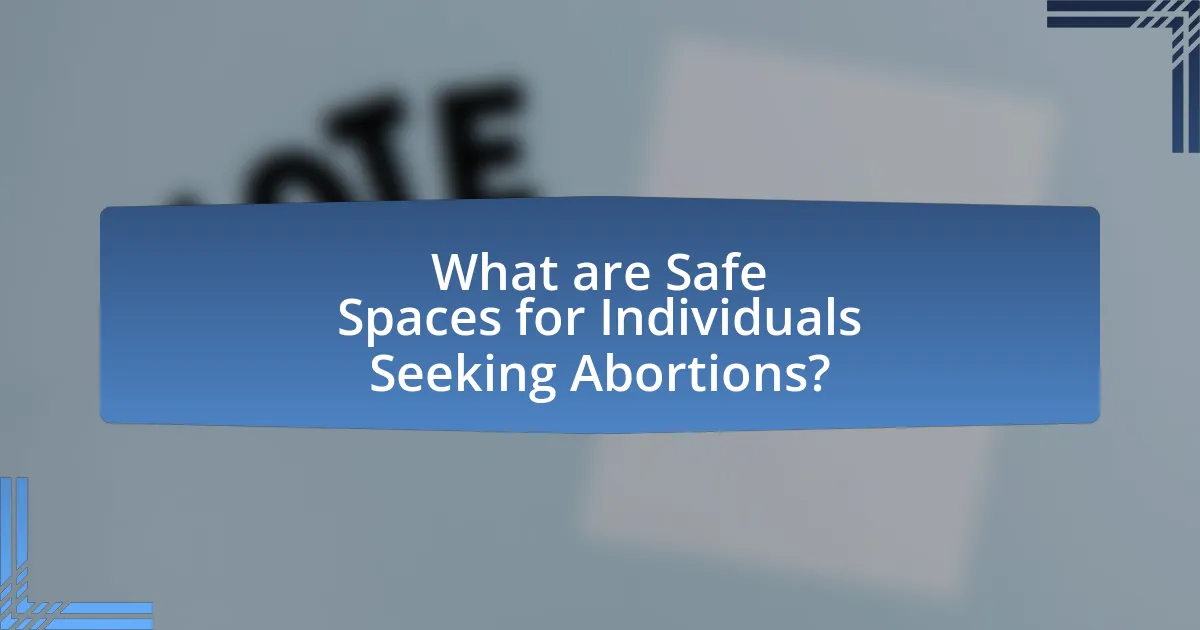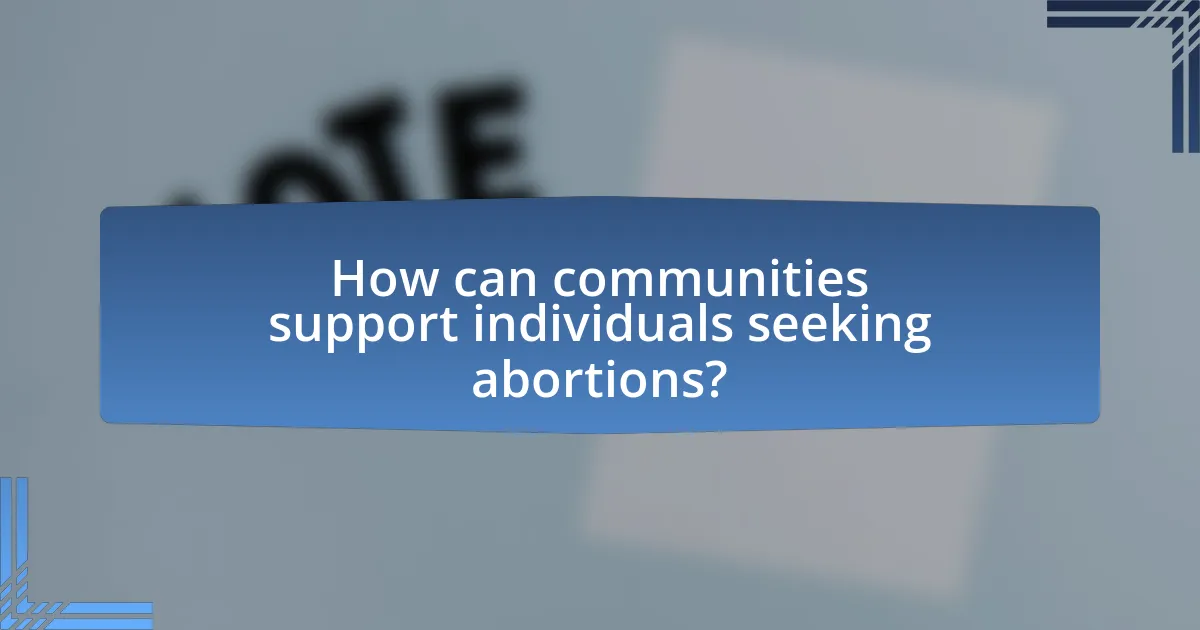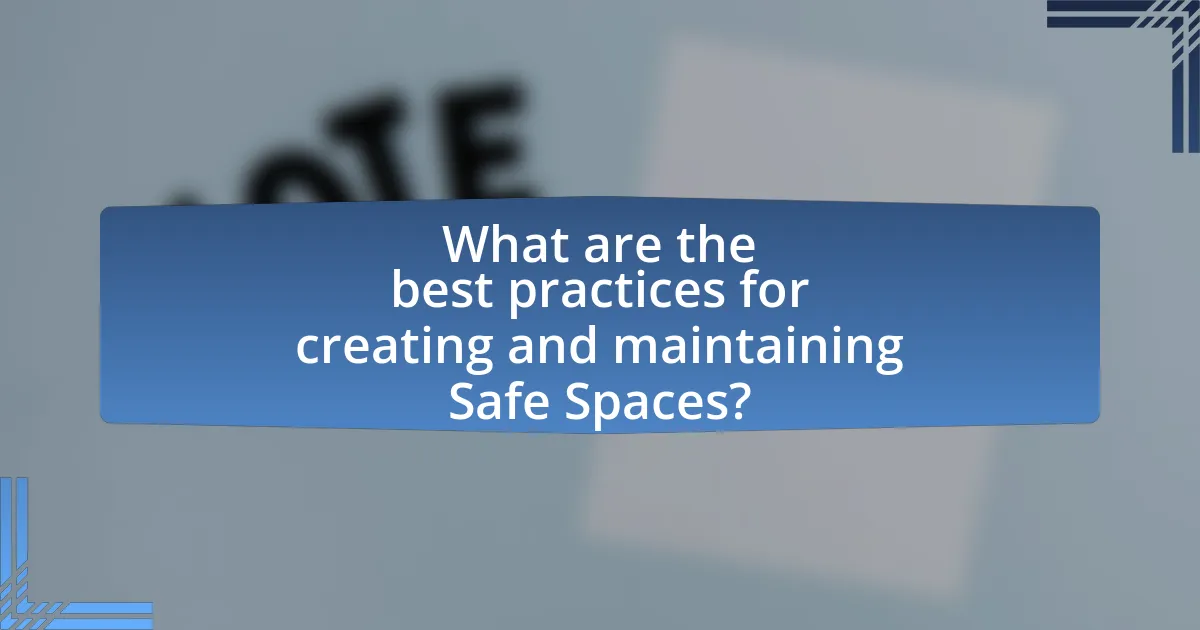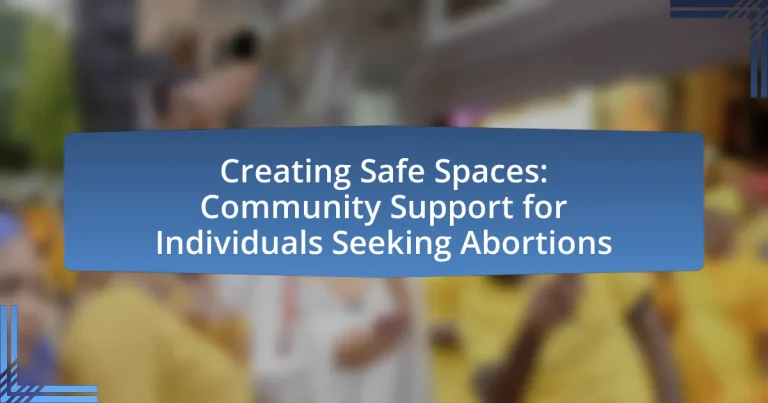Safe spaces for individuals seeking abortions are designated environments that provide essential emotional, physical, and informational support, fostering a non-judgmental atmosphere for those navigating reproductive decisions. These spaces address various challenges, including legal restrictions, financial barriers, and social stigma, by offering resources, counseling, and community support. The article explores the importance of safe spaces, the types that exist, and how community involvement can enhance their effectiveness. It also discusses best practices for maintaining confidentiality and safety, the role of online platforms, and strategies for building trust within communities to support individuals seeking abortions.

What are Safe Spaces for Individuals Seeking Abortions?
Safe spaces for individuals seeking abortions are designated environments that provide emotional, physical, and informational support to those considering or undergoing the procedure. These spaces aim to create a non-judgmental atmosphere where individuals can access resources, counseling, and medical care without fear of stigma or harassment. Research indicates that supportive environments significantly improve the mental well-being of individuals facing reproductive decisions, as they foster open dialogue and provide essential services tailored to their needs.
Why are Safe Spaces important in the context of abortion?
Safe spaces are important in the context of abortion because they provide a supportive environment where individuals can discuss their feelings, experiences, and choices without fear of judgment or stigma. These spaces facilitate open dialogue, allowing individuals to access accurate information and emotional support, which is crucial during a potentially distressing time. Research indicates that supportive environments can significantly reduce anxiety and improve decision-making for those facing reproductive choices, highlighting the necessity of safe spaces in promoting mental well-being and informed consent.
What challenges do individuals face when seeking abortions?
Individuals seeking abortions face numerous challenges, including legal restrictions, financial barriers, and social stigma. Legal restrictions vary by region, with some areas imposing waiting periods, mandatory counseling, or outright bans, which complicate access. Financial barriers arise from the costs associated with the procedure, travel, and childcare, often making it difficult for low-income individuals to obtain necessary care. Social stigma can lead to feelings of isolation and fear of judgment, discouraging individuals from seeking support or sharing their experiences. According to the Guttmacher Institute, 75% of women who seek abortions are low-income, highlighting the financial challenges they face.
How do Safe Spaces address these challenges?
Safe Spaces address challenges faced by individuals seeking abortions by providing a supportive and non-judgmental environment where they can access information, resources, and emotional support. These spaces facilitate open dialogue, allowing individuals to express their concerns and experiences without fear of stigma or backlash. Research indicates that such environments can significantly reduce anxiety and improve decision-making, as individuals feel validated and understood. For instance, a study published in the Journal of Community Health found that participants in supportive environments reported higher levels of satisfaction with their abortion experience and felt more empowered in their choices.
What types of Safe Spaces exist for individuals seeking abortions?
Safe spaces for individuals seeking abortions include clinics that provide confidential services, support groups that offer emotional and psychological assistance, and online platforms that facilitate access to information and resources. These clinics often ensure privacy and a non-judgmental environment, while support groups create a community for shared experiences and coping strategies. Online platforms can connect individuals with telehealth services and educational materials, enhancing accessibility and support.
How do community centers function as Safe Spaces?
Community centers function as safe spaces by providing a supportive environment where individuals can access resources, share experiences, and receive emotional support related to sensitive issues, including abortion. These centers often offer confidential services, such as counseling, educational workshops, and peer support groups, which empower individuals to make informed decisions about their reproductive health. Research indicates that community centers play a crucial role in reducing stigma and fostering a sense of belonging, which is essential for individuals navigating challenging circumstances. For example, a study published in the Journal of Community Health found that participants who engaged with community support services reported higher levels of emotional well-being and reduced feelings of isolation.
What role do online platforms play in creating Safe Spaces?
Online platforms play a crucial role in creating Safe Spaces by providing accessible environments for individuals seeking support, particularly in sensitive contexts like abortion. These platforms facilitate anonymous communication, allowing users to share experiences and seek advice without fear of judgment or stigma. Research indicates that online communities can significantly reduce feelings of isolation, with studies showing that 70% of participants in such forums reported feeling more supported after engaging with others facing similar challenges. Additionally, online platforms often implement moderation policies to ensure respectful interactions, further enhancing the safety and comfort of users.

How can communities support individuals seeking abortions?
Communities can support individuals seeking abortions by providing access to resources, emotional support, and safe environments. Access to resources includes offering information about local clinics, financial assistance for procedures, and transportation services to healthcare facilities. Emotional support can be facilitated through peer support groups, counseling services, and hotlines that offer confidential assistance. Creating safe environments involves advocating for reproductive rights, ensuring privacy for individuals, and fostering a non-judgmental atmosphere. Research indicates that supportive community networks significantly improve the well-being of individuals facing reproductive health decisions, highlighting the importance of collective action in this area.
What resources are essential for effective community support?
Essential resources for effective community support include trained volunteers, access to healthcare services, educational materials, and safe spaces for discussion. Trained volunteers provide emotional and logistical support, ensuring individuals feel understood and guided. Access to healthcare services is crucial, as it connects individuals with medical professionals who can offer necessary care and information regarding abortion options. Educational materials empower individuals with knowledge about their rights and available resources, fostering informed decision-making. Safe spaces for discussion allow individuals to share experiences and seek support without fear of judgment, promoting a sense of community and belonging. These resources collectively enhance the effectiveness of community support for individuals seeking abortions.
How can financial assistance programs help individuals?
Financial assistance programs can help individuals by providing the necessary funds to cover costs associated with abortion services, which can be a significant financial burden. These programs often assist with expenses such as medical fees, travel costs, and related healthcare services, enabling individuals to access safe and timely abortion care. For instance, a study by the Guttmacher Institute found that financial barriers are a leading reason individuals delay or forgo abortion services, highlighting the critical role of financial assistance in ensuring access to reproductive healthcare.
What educational resources are necessary for informed decision-making?
Educational resources necessary for informed decision-making include comprehensive sexual education, access to accurate medical information, and legal resources regarding reproductive rights. Comprehensive sexual education equips individuals with knowledge about reproductive health, contraception, and the implications of abortion, which is essential for making informed choices. Access to accurate medical information, such as data from reputable health organizations like the World Health Organization, ensures that individuals understand the medical procedures and potential risks involved. Legal resources provide clarity on the rights and options available to individuals seeking abortions, which is crucial in navigating the complexities of reproductive health laws.
How can community members get involved in supporting Safe Spaces?
Community members can get involved in supporting Safe Spaces by volunteering their time, resources, and skills to organizations that provide assistance to individuals seeking abortions. Engaging in local advocacy efforts, such as participating in awareness campaigns or attending community meetings, helps raise awareness about the importance of Safe Spaces. Additionally, community members can donate funds or supplies to these organizations, which often rely on community support to operate effectively. Research indicates that community involvement significantly enhances the accessibility and effectiveness of services offered in Safe Spaces, thereby fostering a supportive environment for individuals in need.
What volunteer opportunities exist within Safe Spaces?
Safe Spaces offers various volunteer opportunities, including providing emotional support, assisting with administrative tasks, and participating in outreach programs. Volunteers can engage directly with individuals seeking abortions by offering companionship and guidance, which is crucial for creating a supportive environment. Additionally, administrative volunteers help manage resources and coordinate events, while outreach volunteers work to raise awareness about Safe Spaces and its services within the community. These roles are essential for fostering a compassionate and informed support network for those in need.
How can individuals advocate for Safe Spaces in their communities?
Individuals can advocate for Safe Spaces in their communities by organizing awareness campaigns that educate the public about the importance of these spaces for individuals seeking abortions. These campaigns can include workshops, informational sessions, and distribution of literature that highlights the need for supportive environments, as studies show that access to Safe Spaces significantly reduces stigma and enhances emotional well-being for those in need. Engaging local leaders and stakeholders to support policies that protect and promote Safe Spaces is also crucial, as community backing can lead to more effective implementation of supportive measures.

What are the best practices for creating and maintaining Safe Spaces?
The best practices for creating and maintaining Safe Spaces include establishing clear guidelines, fostering open communication, and ensuring inclusivity. Clear guidelines help define acceptable behavior and create a sense of security, while open communication encourages individuals to express their needs and concerns. Inclusivity ensures that diverse voices are heard and respected, which is essential in a supportive environment. Research indicates that environments with established norms and active participation lead to higher satisfaction and safety among individuals seeking support, particularly in sensitive contexts like abortion services.
How can Safe Spaces ensure confidentiality and safety for individuals?
Safe Spaces can ensure confidentiality and safety for individuals by implementing strict privacy policies and secure communication channels. These measures include anonymizing personal information, restricting access to sensitive data, and training staff on confidentiality protocols. For instance, organizations often utilize encrypted messaging systems to facilitate private conversations, ensuring that individuals can seek support without fear of exposure. Additionally, Safe Spaces may establish clear guidelines that prohibit the sharing of personal stories or identities without consent, reinforcing a culture of trust and safety.
What policies should be in place to protect individuals’ privacy?
Comprehensive data protection policies should be in place to protect individuals’ privacy, particularly for those seeking abortions. These policies must include strict consent requirements for data collection, ensuring that individuals are fully informed about what data is being collected and how it will be used. Additionally, robust encryption standards should be implemented to safeguard personal information from unauthorized access.
Furthermore, policies should mandate the anonymization of data wherever possible, minimizing the risk of identification. Regular audits and assessments of data handling practices are essential to ensure compliance with privacy regulations, such as the General Data Protection Regulation (GDPR), which emphasizes the importance of individual privacy rights.
These measures collectively create a framework that not only protects personal information but also fosters trust within communities, allowing individuals to seek necessary support without fear of exposure or judgment.
How can staff and volunteers be trained to handle sensitive situations?
Staff and volunteers can be trained to handle sensitive situations by implementing comprehensive training programs that focus on empathy, active listening, and crisis intervention techniques. These programs should include role-playing scenarios that simulate real-life situations, allowing participants to practice their responses in a safe environment. Research indicates that training in emotional intelligence significantly enhances the ability to manage sensitive interactions effectively, as evidenced by a study published in the Journal of Applied Psychology, which found that individuals trained in emotional awareness were better equipped to navigate challenging conversations. Additionally, ongoing workshops and refresher courses can reinforce skills and adapt to evolving community needs, ensuring that staff and volunteers remain prepared to support individuals seeking abortions in a compassionate and informed manner.
What common challenges do Safe Spaces face, and how can they be overcome?
Safe Spaces commonly face challenges such as stigma, lack of resources, and insufficient community awareness. Stigma surrounding abortion can deter individuals from seeking support, leading to isolation. To overcome this, Safe Spaces can implement educational programs that promote understanding and reduce stigma, fostering a more supportive environment. Additionally, limited resources can hinder the effectiveness of these spaces; therefore, establishing partnerships with local organizations can enhance resource availability and support services. Lastly, raising community awareness through outreach initiatives can inform individuals about the existence and purpose of Safe Spaces, encouraging more people to utilize these resources.
How can funding shortages impact the effectiveness of Safe Spaces?
Funding shortages can significantly diminish the effectiveness of Safe Spaces by limiting resources necessary for their operation. When financial support is inadequate, Safe Spaces may struggle to provide essential services such as counseling, medical assistance, and educational programs, which are crucial for individuals seeking abortions. A study by the Guttmacher Institute indicates that organizations providing reproductive health services often face budget constraints that hinder their ability to reach and support those in need. Consequently, reduced funding can lead to fewer trained staff, inadequate facilities, and limited outreach efforts, ultimately compromising the safety and support that these spaces are designed to offer.
What strategies can be implemented to build community trust?
To build community trust, organizations can implement transparent communication, active engagement, and consistent support. Transparent communication involves sharing information openly about services, policies, and decision-making processes, which fosters a sense of honesty and reliability. Active engagement includes involving community members in discussions and decision-making, ensuring their voices are heard and valued. Consistent support means providing reliable resources and assistance, demonstrating commitment to the community’s well-being. Research shows that communities with high levels of trust often have better health outcomes and increased participation in local initiatives, highlighting the importance of these strategies in creating supportive environments for individuals seeking abortions.
What practical steps can individuals take to support Safe Spaces?
Individuals can support Safe Spaces by actively volunteering their time and resources to organizations that provide assistance to individuals seeking abortions. Engaging in community outreach initiatives, such as distributing informational materials about available services, can help raise awareness. Additionally, individuals can donate funds or supplies to local clinics and support groups that facilitate access to safe abortion services. Research indicates that community support significantly enhances the effectiveness of these organizations, as evidenced by a study published in the Journal of Community Health, which found that increased volunteer involvement correlates with improved service delivery outcomes.


